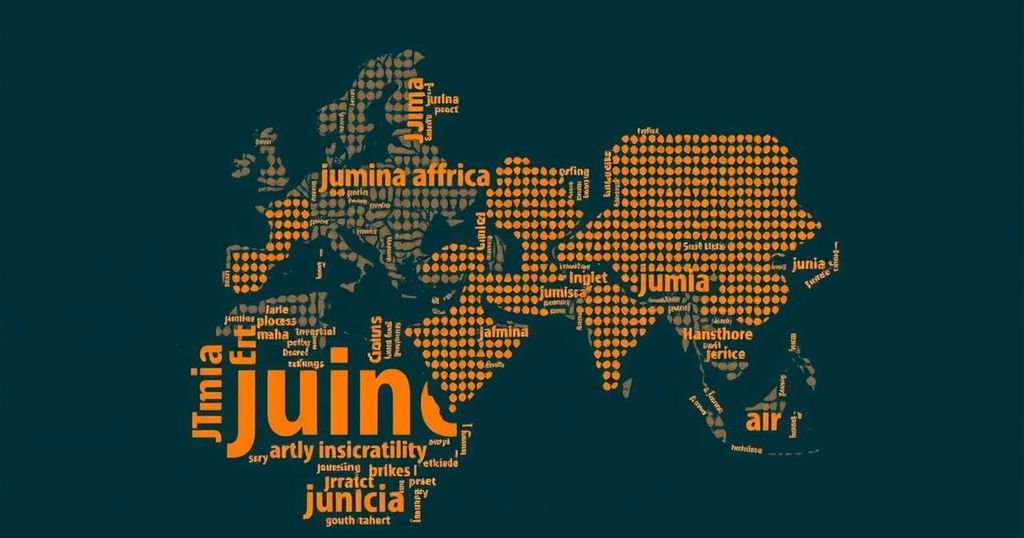Jumia is ceasing operations in Tunisia and closing its South Africa-based clothing site, Zando, as part of a strategy to reduce costs and focus on markets with stronger growth prospects. The company has previously cut its workforce by 40% and reported a revenue decline in the first half of 2024. CEO Francis Dufay remains optimistic about recovering losses through its successful markets, despite challenges in profitability in the affected regions.
Jumia, the African e-commerce platform, has announced a strategic downsizing by ceasing its operations in Tunisia and shuttering its online clothing outlet, Zando, in South Africa by year-end. This move is part of a broader cost-reduction strategy aimed at concentrating resources on markets presenting stronger growth potential. A company representative stated, “Money isn’t limitless, and we prefer to focus on other markets where growth prospects are strong.” Previously, in a similar effort to streamline operations, Jumia terminated its home meal delivery service, Jumia Food, in seven nations including Tunisia, Algeria, Kenya, Uganda, Morocco, Nigeria, and Côte d’Ivoire. This follows earlier exits from Cameroon and Tanzania in 2019. Despite these closures, the headquarters in Abidjan is minimizing concerns about the reductions, noting Zando and Tunisia contributed only 4.5% and 3% respectively to the gross merchandise value in the first half of 2024. The underlying challenges prompting these decisions include difficulties in achieving profitability. Jumia cited insufficient growth metrics within these regions, specifically noting that Zando’s model no longer aligns with the strategic focus spearheaded by CEO Francis Dufay, which has pivoted towards cosmetics and electronics. The introduction of Amazon into the South African market last spring may have further influenced Jumia’s decision to withdraw services there. In Tunisia, ongoing macroeconomic obstacles have hindered profitability within that market segment. CEO Dufay expressed optimism regarding the company’s ability to offset these losses through its more successful markets. Recent expansions of warehouses in Cairo, Lagos, Abidjan, and Casablanca, along with a strategy targeting secondary cities and rural locales, illustrate Jumia’s commitment to growth despite operational cutbacks. The platform remains active in other African countries, including Algeria, Uganda, Senegal, Ghana, and Kenya. These recent developments follow a significant reduction in Jumia’s workforce, which has decreased by 40% since Dufay took the helm in November 2022. The company reported a 17% decline in revenue during the first half of 2024, amounting to $36.5 million. In an effort to bolster its financial standing, Jumia successfully raised nearly $100 million through a stock sale on Wall Street in August. As of October 16, Jumia’s stock was valued at approximately $5.06.
The article discusses Jumia’s recent strategic decisions to streamline its operations by withdrawing from certain markets, specifically Tunisia and South Africa. This follows a trend of cost reductions and a focus on stronger market prospects, highlighting challenges in profitability amid increased competition and macroeconomic factors in various regions. Jumia’s broader efforts to consolidate operations, including workforce reduction and targeting growth in more lucrative markets, are discussed along with recent financial performance and strategic expansion plans.
In conclusion, Jumia’s recent operational reductions in Tunisia and South Africa signify an ongoing strategy to optimize its footprint in the African market, concentrating on areas with higher growth potential. The challenges faced in achieving profitability within these markets, compounded by strong competition and adverse economic conditions, have prompted the company to refocus its efforts on more promising avenues. With significant workforce reductions and recent fundraising endeavors demonstrating a commitment to sustainability and growth, Jumia is poised to navigate its evolving landscape strategically.
Original Source: www.theafricareport.com







